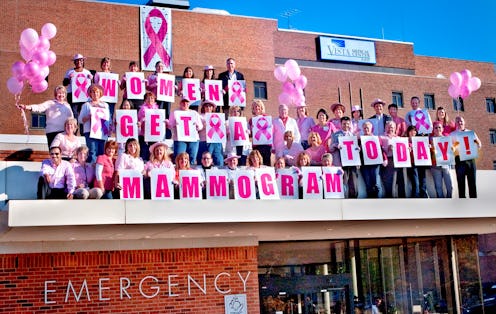News
New Mammogram Study Only Tells Half the Story

It's easy to be confused about mammograms these days. Physicians, researchers, public health advocates and government agencies can't get their stories straight on this breast cancer screening measure. Once recommended yearly starting at age 40, there's now a hodgepodge of conflicting mammogram guidelines and advice.
A new mammogram study does nothing to clear up confusion. Researchers from Harvard Medical School concluded that women in their 40s could benefit from more frequent mammography screenings, while older women may benefit from less.
This runs contra to the current trend in mammogram screening advice, which advocates waiting until age 50 for the first one. In 2009, the influential U.S. Preventative Services Task Force reported that mammograms don't seem to benefit women in their 40s at all.
The Harvard researchers looked at data on 7,301 women diagnosed with breast cancer in the 1990s. They tracked these women through 2007, at which point 609 had died from the disease.
Of those who died, nearly three-quarters were women who never got screened for breast cancer, or failed to do so regularly. About half of the deaths were in women under 50, while only 13 percent were in women over 70 years old.
This suggests that less frequent screening is needed at ages 69 and older, but more frequent screening in younger women should be encouraged, the researchers wrote.
But critics say the data only tells half the story. Without knowing the mammogram habits of those who lived, we can't really know whether screening is terribly effective.
"If, among women who live, 30 percent were screened and 70 percent were not, everyone would agree that screening had no effect," Dr. H. Gilbert Welch, a professor of medicine at Dartmouth, told LiveScience.
The study also fails to analyze which treatments the patients who died from breast cancer received. And it ignores the fact that women who never or rarely get mammograms may be different in other ways that affect breast cancer death risk (lower socio-economic status, less health-conscious, less trusting of medical care, etc.).
What's the danger in extra preventative measures? Mammograms have led to early detection that saves many lives. And younger women get breast cancer too, so why don't we start screening everybody in their 20s or 30s?
The problem lies in over-diagnosis. Mammograms may give false positive results, leading to unnecessary additional testing such as diagnostic mammograms, ultrasound, and biopsy. They're also notorious for catching early-stage cancers that aren't likely to become harmful within a woman's lifetime. The result is many a woman undergoing expensive and potentially dangerous cancer treatments (with all the inherent side effects) to "treat" a condition that would never do any harm.
Image: jimsphotoworld on flickr